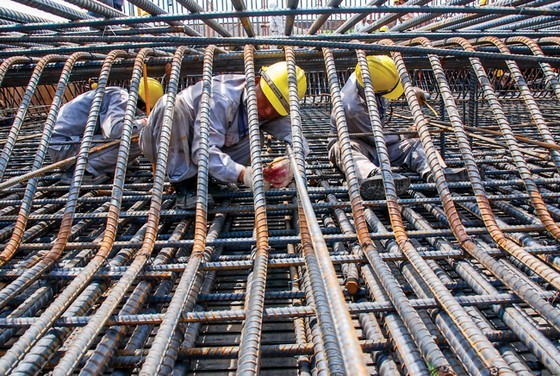 Illustrative photo (Source: Saigon Investment)
Illustrative photo (Source: Saigon Investment)
Saigon Investment interviewed Dr. CAN VAN LUC, a member of the National Financial and Monetary Policy Advisory Council, to discuss this issue in more detail.
JOURNALIST: - Sir, what do you think about the impact of world commodity prices on Vietnam in the first few months of the year?
Dr. CAN VAN LUC: - The World Bank figures show that from the beginning of the year through April, global energy prices rose by 30%, while prices of other commodities increased by 16%. Vietnam imports various products, making it impossible to avoid an impact. Over the last four months, the Consumer Price Index (CPI) climbed by 1.27%, compared to 2.7% in the same period in 2020. Over the last four months also, average inflation edged up by just 0.74% in comparison with the same period in 2020. In fact, CPI has not seen a big increase in the last four months because of low demand and a slow Cash Conversion Cycle (CCC). Therefore, inflation has been triggered mainly by prices rather than currency factors as of now.
Price-triggered inflation can be seen in logistics costs, which are now much higher in Vietnam than other ASEAN countries and 1.3 or 1.5 times as high as global average while logistics costs make up a big part of product prices, upto 30% to 35% of total value of several products, negatively affecting price hike and inflation in Vietnam. If price of rice or exported foods increase 10% compared with 2020 due to increased logistics costs, for instance, domestic rice price will also rise by about 12% to 15%, causing CPI to pick up by 0.4 or 0.5 percentage points.
- Sir, you said currency-triggered inflation is still quite modest, but cheap money seems to be bringing unpredictable risks, such as land fever and explosion in money flow into the stock market in the last few months. What is your opinion on this?
- As far as the matter of currency is concerned, I suppose that there are potential risks and complexities because of two major reasons. First, cash supply is moderate, but ineffective use of capital will put long-term pressure on inflation, especially money supply (M2) to GDP ratio in Vietnam which is comparatively high at 138%, higher than the ASEAN average, when Vietnam credit market size in late 2019 was around 138% of GDP in comparison with 86% of GDP in ASEAN-9. ICOR in Vietnam in the 2016 to 2020 period was considerably higher than regional figures and World Bank standards for developing countries.
Second, cheap money keeps flowing into real estate properties and securities, and has become one of the major causes of fever in these markets over the last few months. In the real estate market alone, the prices in 2020 soared by 20% to 30%, far higher than the world average increase of 5.6%. Prices of land lots skyrocketed in areas where there have been plans to develop new infrastructure, airports or piers. Now competent agencies have identified the problems and taken stringent measures to tackle them effectively.
With regards to the stock market, stock prices have been rising sharply since the beginning of the year because of sources of cheap capital from Government relief aid packages at low interest rates. The stock market is on shaky ground as the tie between the stock market and the real economy has become weak. Herd mentality and financial leverage has always existed, especially in the Vietnamese stock market. These are factors of instability, and the Ministry of Finance and the State Bank of Vietnam have recently given warnings and successfully curbed the cash flow from such sources.
- Sir, what do you think can reduce inflation pressure?
- I think the first thing is the macro-economic foundation with stable exchange rates. By now, Vietnam's big balances like public debts, budget deficits and trade balance are better than before, plus better control of inflation rate below 4% over the last five years, and a stable supply and demand for foreign exchange and better control of the gold market. All these factors together with more and more flexible exchange rate management policies have contributed to keeping the exchange rate stable.
The second thing is an increasingly effective combination of policies on currencies, fiscal year and prices, like the issue of Government bonds over the last couple of years. Third, the calculation of CPI is getting closer to international standards, with fewer and fewer essential foods and food products included, improving the stability of long-term inflation and preventing all kinds of shock price hikes. Fourth, demand is still weak in CCC as well.
However, inflation pressure is still high this year. Therefore, I strongly believe that it is essential to manipulate cash flow in ways that they pour into key economic areas and continue with measures for controlling price of real estate properties, especially land lots, because land fever can seriously affect investors and the market. It is also important to improve the monetary and fiscal policies and adopt flexible policies on inflation control and economic growth, for short, medium and long-term plans in order to appropriately address the problems, effectively implement monetary and fiscal policies and better control the markets, especially the bond market. It is significant to continue to improve the health of the corporate bond market, reduce the credit capital pressure and diversify the channels for raising funds and distributing the capital in the economy.
However, it is necessary to consider the global financial risks and uncertainties, evaluate the effects and come up with appropriate measures for Vietnam. Additionally, we will develop a digital economy, with electronic channels for distribution and cashless payments which will enable us to successfully contain the pandemic and ensure that goods are delivered as scheduled. These will make it possible for reduction of inflation pressure.
- Thank you very much.
























